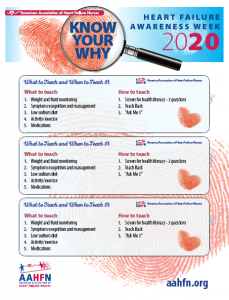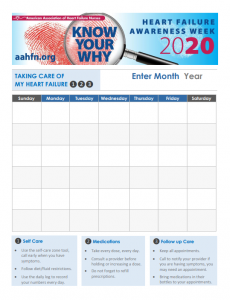The American Association of Heart Failure Nurses launches “Know Your Why” campaign for Heart Failure Awareness Week 2020
AAHFN launches “Know Your Why,” a heart failure awareness campaign that provides customized education for those caring for heart failure patients.
MOUNT LAUREL, NEW JERSEY, UNITED STATES, February 5, 2020 /EINPresswire.com/ -- The American Association of Heart Failure Nurses (AAHFN) is pleased to announce, “Know Your Why,” a week-long heart failure awareness campaign centered around providing customized heart failure education for stakeholders involved in treating and caring for individuals suffering from the disease.“Know Your Why” is focused on improving knowledge among heart failure nurses, as well as patients and their families using an etiology-specific lens. The campaign takes a multi-faceted approach in providing patients the tools needed to better understand their specific risk factors, while encouraging nurses to embrace a patient-centered approach with a focus on prevention.
Heart failure is a prevalent, debilitating and life-threatening disease, affecting nearly 6.5 million Americans with approximately 550,000 new cases diagnosed each year.
Patients with heart failure have an increased risk of experiencing serious complications related to the progression of the disease, including unintended consequences of the medications used to manage their condition.
“Hospital systems continue to work on processes to improve the transition from “hospital to home”, as this is a most vulnerable period for patients with heart failure. Medication reconciliation and early post discharge follow up are two additional strategies to reduce heart failure readmissions,” says AAHFN President, Beth Towery Davidson, DNP, ACNP, CCRN, CHFN.
The World Health Organization (WHO) has designated 2020 “The Year of the Nurse.” Additionally, the week of February 9, 2020 is Heart Failure Awareness Week. Heart Failure Nurses are an integral component in the quality of care for Heart Failure patients.
The “Know Your Why” campaign includes patient and nurse tools to identify trends in self-monitoring metrics to “Know Your Why” with heart failure. As an example, patient tools provided include a heart failure calendar with self-monitoring techniques, blood pressure and hereditary risk teaching references, and a list of questions for caregivers to ask at every appointment. Nurses are provided include a “Know Your Why” worksheet and a what to teach and when to teach it badge buddy.
Visit aahfn.org to access all campaign resources for patients, nurses and caregivers to facilitate important self-care strategies, lifestyle and behavioral changes that heart failure patients must endure in their care process. For more information on the 2020 “Know Your Why” campaign, please visit www.aahfn.org/hfawarenessweek2020.
About Heart Failure
Heart failure, which means the heart does not contract with enough force to pump sufficient blood throughout the body, is a debilitating and life-threatening condition, affecting nearly 6 million Americans.(1,2) It is the leading cause of hospitalization among Americans over the age of 65.(3) Heart failure presents a major and growing health-economic burden that currently exceeds $30 billion in the United States, which accounts for both direct and indirect costs.(1,4)
About the American Association of Heart Failure Nurses (AAHFN)
The AAHFN is a nonprofit specialty organization dedicated to advancing nursing education, clinical practice and research to improve heart failure patient outcomes. The goal of AAHFN is to set the standards for heart failure nursing care. The American Association of Heart Failure Nurses unites professionals, patients and caregivers in the support and advancement of heart failure practice, education and research, thus promoting optimal patient outcomes. AAHFN serves as the interface for sharing ideas, translating research findings into practice and setting priorities for the future. AAHFN focus’ on patients across all environments of care from the hospital, to the clinic, to home.
References
1. Mozaffarian D, Benjamin EJ, Go AS, et al. Heart Disease and Stroke Statistics—2016 Update: A report from the
American Heart Association. Circulation. 2016; 132:000-000. doi: 10.1161/CIR.0000000000000350.
2. Fauci A, Longo D. Disorders of the Heart. Harrison’s ‘Principles of Internal Medicine. 17th ed. New York, NY;
McGraw-Hill Book Co; 2008;4:1442-55.
3. Wier LM, Pfuntner A, Maeda J, et al. HCUP Facts and Figures: Statistics on Hospital-based Care in the United States,
2009. Agency for Healthcare Research and Quality. 2011; 1-3.
4. Heidenreich PA, Albert NM, Allen LA, et al. Forecasting the impact of heart failure in the United States: a policy
statement from the American Heart Association. Circ Heart Fail. 2013;6:606-619.
Gallagher R, Luttik M-L, Jaarsma T. Social Support and Self-care in Heart Failure. J Card Nurs. 2011; Vol. 26, No.
6, pp 439-445.
Karyn Lockshine
American Association of Heart Failure Nurses
+1 856-793-0806
email us here
Visit us on social media:
Facebook
Twitter
Legal Disclaimer:
EIN Presswire provides this news content "as is" without warranty of any kind. We do not accept any responsibility or liability for the accuracy, content, images, videos, licenses, completeness, legality, or reliability of the information contained in this article. If you have any complaints or copyright issues related to this article, kindly contact the author above.



